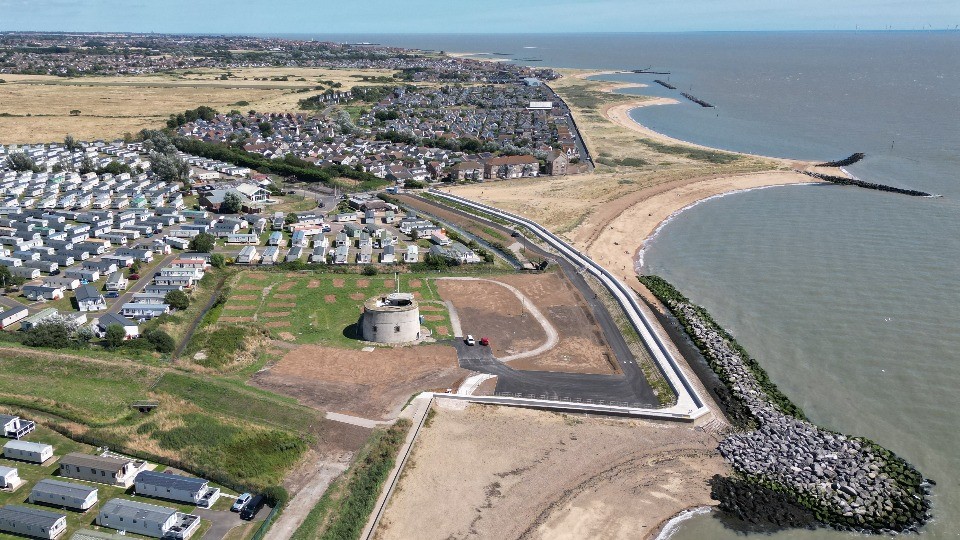The Cockett Wick seawall improvement scheme has been completed, ensuring 3,000 homes and businesses are better protected from tidal flooding.
With a £12m investment, the works include the placement of 14,000 tonnes of Norwegian granite, 150 steel piles and 330 metres of reinforced concrete footpath and seawall.
This scheme is a key part of the Essex and South Suffolk shoreline management plan, which aims to sustain the viability of the seaside communities. This scheme provides long-term flood resilience, supporting aspirations for further growth and regeneration of seaside towns.
Now finished, the key objective of the project has been to provide an adaptive approach to meeting challenges from climate change. The new wall is designed to account for sea-level rise and climate change, accommodating a further wall raising in 50 years’ time.
Decarbonisation was at the heart of decision making and was reached through collaboration with the contractor, BAM Nuttall, and design consultant, Jacobs. The design was amended to use 152 recycled steel tube piles rather than new steel sheet piles, saving approximately 1,000 tonnes of carbon.
The Environment Agency ensured further carbon savings by transporting the revetment rock in 6 barge movements instead of 700 flatbed lorry-loads, saving 48 tonnes of carbon. Some 1,200 tonnes of surplus rock were redistributed to support several local collaboration projects with landowners to protect seawalls from erosion.
Environment Agency staff and contractors were engaged with community activities throughout the works. This included demonstrations at local schools, taking on 2 work experience students, raising £1,400 for a local charity and hosting regular drop-in sessions.
John Lindsay, Essex coastal engineer for the Environment Agency, said:
“We’re delighted that the Cockett Wick seawall improvements scheme is now finished. The work will make a real difference to providing long-term flood protection for the local community, protecting homes and businesses and supporting the future growth, investment and regeneration of Jaywick.
“We would like to thank the local community for their patience, support and cooperation during the completion of the works.”
Robert Harvey, project manager for BAM Nuttall, said:
“We are delighted to have worked collaboratively with the Environment Agency and Jacobs on the Cockett Wick project, providing a successful flood defence scheme for the area, with sustainability, innovation and the local area at its core, benefiting generations to come.”
Louise Oldfield-Trim, project manager for Jacobs, said:
“A key factor in the project’s success was the full commitment to collaboration by the entire team, including the Environment Agency, BAM and Jacobs.
“By prioritising sustainability at the forefront of the design, we developed an innovative scheme that achieved substantial carbon efficiencies. This essential cooperation throughout the design and construction stages ensured a smooth, cost-effective delivery.”
Floods minister Emma Hardy said:
“The completion of the Cockett Wick seawall improvement project ensures thousands of homes and businesses in one of the most vulnerable areas of the country will receive better protection from the growing threat of tidal flooding.
“Protecting communities around the country from flooding, including those on the Essex coast, is one of our core priorities. That’s why the Government will launch a flood resilience taskforce to turbocharge the delivery of flood defences, drainage systems and natural flood management schemes.”



